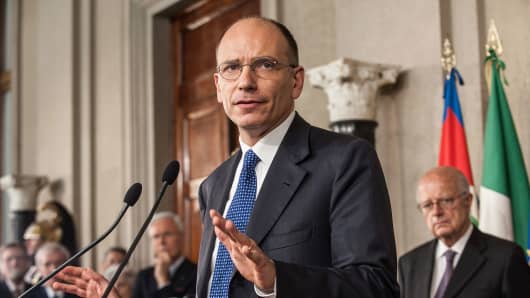Italy's political deadlock may be over after the country's President nominated center-left politician Enrico Letta as prime minister on Wednesday, but Letta has already fired a shot across Europe's bows on austerity.
Letta is viewed as a moderate with allies in every political party. He is the nephew of Berlusconi's chief of staff, Gianni Letta but has been the deputy head of the center-left Democratic Party (PD) since 2009. On Thursday, he is to start talks with other party leaders on forming a grand coalition with former prime minister Silvio Berlusconi and his center-right bloc.
(Read More: Italy's President Invites Letta to Form Government)
The end to the impasse means Italy won't have to return to the polls right away. But Letta's comments after he accepted the premiership have thrown Italy's austerity program, introduced by technocrat leader Mario Monti, an economist by training who had the support of Brussels and Germany, into doubt.
"European policies are too focused on austerity which is no longer enough," Letta said after accepting the mandate to govern from 87-year old President Giorgio Napolitano.
"The country is waiting for a government. Everyone knows this is a situation that cannot go on like this," Letta said, adding that politics in Italy had "lost all credibility."
(Read More: Hollow Victory for Italy as More Turmoil Looms)
One analyst told CNBC on Thursday that despite Letta's anti-austerity comments, the new Italian prime minister will have good relations with the European Union.
"From the European point of view, Letta's appointment is good news. It's certainly much easier imagining Germany's Chancellor Angela Merkel having a tough conversation with Letta, rather than say with Berlusconi or even other figures within Letta's PD party," David Lea, a senior European analyst at risk consultancy Control Risks told CNBC.
"Letta has been saying that he's not a huge supporter of austerity, he very much backed (Jose Manuel) Barroso's words when he suggested that austerity might be a policy that had had its day. There are elements in Italy, such as the property tax, that have gone down very badly in Italy. So I expect he will roll back some of Monti's more technocratic reforms in that area," Lea told CNBC Europe's "Squawk Box."
(Read More: Italy's Political Chaos Deepens on Presidential Vote)
Meanwhile, Letta said on Wednesday that he was ready to work with his rivals to tackle labor and institutional reforms but said he would not form a government "at all costs" signalling that he would resign if the parties did not work together.





